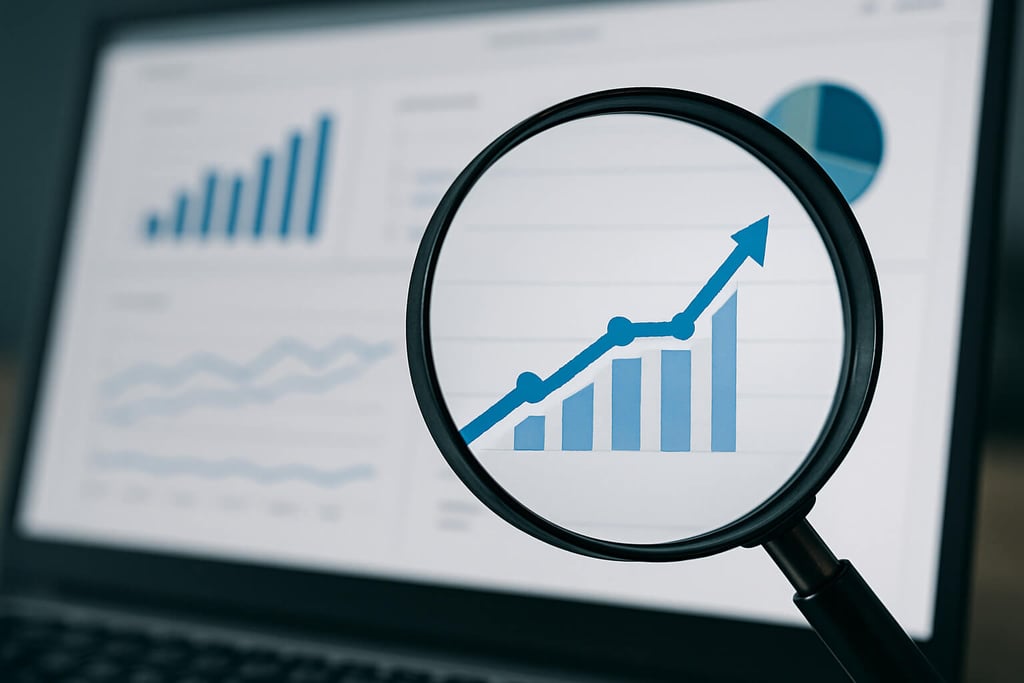SEOJet Flight Blog
Measure SEO ROI: Track Rankings, Performance, and Success
Measure SEO ROI to prove success! Track rankings, performance, and SEO traffic. Understand your ROI of SEO efforts and key KPIs.
TECHNICAL SEO
Ardene Stoneman
2/26/20256 min read


Measure SEO ROI to Drive Better Results from Your SEO Efforts
If you’re putting time or money into SEO, you need to know it’s working. This article breaks down how to measure SEO ROI properly and what metrics you actually need to watch.
We’ll cover what ROI means in SEO, how to track it, and how to use it to get better results from your SEO strategy.
If you're trying to prove value, prioritise your SEO work, or make smarter decisions about digital marketing, this guide will help.
Article Outline
What is SEO ROI and Why Does It Matter?
How Do You Measure SEO ROI Accurately?
What Are the Most Useful Metrics to Track SEO Performance?
Why Is It Important to Track SEO Over Time?
How Does Keyword Ranking Affect Your ROI?
Can Organic Traffic Alone Show SEO Success?
What’s the Role of Conversions in Measuring SEO ROI?
Which SEO KPIs Should You Pay Attention To?
What SEO Tools Help You Track ROI Effectively?
Is Your Bounce Rate a Sign of Poor SEO Performance?
How Do Referring Domains and Backlinks Impact SEO ROI?
Does Better User Experience Help SEO ROI?
What’s the ROI of SEO Compared to Other Channels?
How Do You Forecast the ROI of Future SEO Work?
How Can You Improve Your SEO Results Over Time?
What’s the Best Way to Show SEO Results to Your Team or Clients?
1. What is SEO ROI and Why Does It Matter?
SEO ROI (return on investment) tells you how much money you’ve made compared to what you’ve spent on SEO.
It’s the most direct way to prove whether your SEO efforts are paying off.
If you're a business owner or marketing manager, you need to know how your SEO work is affecting revenue.
That means linking organic traffic, keyword ranking, and conversions directly to sales. Without ROI, all you've got are surface-level stats that don't show real business impact.
2. How Do You Measure SEO ROI Accurately?
The formula is simple:
ROI = (Revenue from SEO – Cost of your SEO) ÷ Cost of your SEO
But the detail is where people go wrong. You’ll need to:
Track revenue from organic search traffic using tools like Google Analytics
Add up the full cost of your SEO campaign – tools, staff time, agencies
Attribute leads and sales properly (use landing pages, form IDs, discount codes, etc.)
Once you have these in place, you can calculate and compare the ROI of SEO month on month.
3. What Are the Most Useful Metrics to Track SEO Performance?
To get the full picture, track metrics that reflect both SEO success and business value:
Keyword ranking for your target keywords
Bounce rate on SEO landing pages
Conversion rate for SEO traffic
Revenue from organic search
Other metrics like domain authority, referring domains, and click-through rate (CTR) can add context but shouldn’t be the only things you measure.
4. Why Is It Important to Track SEO Over Time?
SEO is a long game. What you do today might not show results for weeks or even months.
That’s why it’s essential to track SEO consistently. You’ll spot trends, see what’s working, and identify when performance dips. This helps you:
Justify your SEO budget
Adjust your SEO strategies
Make informed decisions based on data
Tracking lets you prove the value of your SEO projects instead of relying on guesswork.
5. How Does Keyword Ranking Affect Your ROI?
Keyword ranking is one of the earliest signs that your SEO is working. When your site ranks well for relevant keywords, your traffic tends to increase – and that usually leads to more conversions.
But rankings alone don’t generate revenue. Focus on:
Ranking for keywords with clear search intent
Matching the right content to the right keywords
Monitoring how rankings influence organic traffic and sales
Use Ahrefs or SEMrush to track keyword ranking across product pages and landing pages. You’ll soon see which keywords actually bring in business.
6. Can Organic Traffic Alone Show SEO Success?
No. Organic traffic shows how many people are finding you through search engines – but it doesn’t show what they do after that.
You need to go beyond visits. Always connect your SEO traffic to:
What pages they land on
How long they stay
What they click
Whether they convert
This is where tools like Google Analytics and Google Search Console help. They show you what happens after the click, so you can measure SEO ROI properly.
7. What’s the Role of Conversions in Measuring SEO ROI?
Conversions are where SEO turns into money.
Whether it’s a sale, a quote request, or a call, a conversion tells you that your SEO traffic did something valuable. To calculate ROI, track the conversion rate of your organic traffic over time.
Ways to improve conversions:
Optimise landing pages for SEO and usability
Use internal linking to guide users to key actions
Match content to search intent
This is one of the most direct ways to improve your ROI from SEO.
8. Which SEO KPIs Should You Pay Attention To?
Your KPIs (key performance indicators) depend on your goals, but for ROI-focused SEO, the top KPIs include:
Organic search traffic volume
Keyword rankings
Conversion rate from SEO
Revenue from organic traffic
Click-through rate (CTR)
Backlinks and referring domains
You might also track bounce rate, time on site, and returning users to measure engagement and the quality of your SEO traffic.
9. What SEO Tools Help You Track ROI Effectively?
A mix of tools gives you the full picture:
Google Analytics – use Google Analytics to connect traffic and conversions
Google Search Console – great for search visibility, clicks, and keyword tracking
Ahrefs – monitor backlinks, referring domains, and keyword ranking
SEMrush – good for competitor tracking and SEO campaign reporting
Most of these tools can integrate into reports, helping you share SEO results clearly with your team or clients.
10. Is Your Bounce Rate a Sign of Poor SEO Performance?
It might be. A high bounce rate often means the user didn’t find what they were looking for.
This could happen because:
The keyword doesn’t match the content
The user experience is bad
The page loads slowly or looks poor on mobile
If bounce rate is high on SEO landing pages, you’ll struggle to convert traffic – and your SEO ROI will suffer. Look for patterns across high-traffic pages and fix them.
11. How Do Referring Domains and Backlinks Impact SEO ROI?
Backlinks remain one of the strongest ranking signals in search engine optimisation. But not all links are equal.
Track:
The number of referring domains
Domain authority and relevance
The pages they link to
Strong backlinks help improve your keyword rankings, which leads to more organic traffic and better ROI over time. Tools like Ahrefs make this easy to track.
12. Does Better User Experience Help SEO ROI?
Absolutely. SEO and user experience are more connected than ever. If users can’t find what they need or don’t trust your site, they’ll bounce.
Good user experience includes:
Fast loading speeds
Clear calls to action
Easy navigation
Optimised content that matches search intent
Google considers these things when ranking pages. Improving them not only boosts your SEO rankings but also increases conversion rate – directly lifting your ROI.
13. What’s the ROI of SEO Compared to Other Channels?
SEO often has one of the highest ROIs of any digital marketing channel. Unlike paid ads, SEO doesn’t stop when you stop spending.
The content, backlinks, and technical fixes keep working long after you’ve done the work.
That said, it takes time to build. But once SEO traffic grows, the return on investment compounds.
Comparing SEO to PPC or social campaigns can help justify longer-term investment in search engine optimisation.
14. How Do You Forecast the ROI of Future SEO Work?
To forecast SEO ROI, use estimated traffic and conversion rate from planned SEO campaigns.
Steps:
Estimate traffic from new rankings using keyword research tools
Apply average conversion rate for your website
Multiply by average order value or lead value
Compare against the cost of your SEO project
Forecasting helps you decide which SEO strategies to prioritise. It’s a key part of making informed decisions about their marketing spend.
15. How Can You Improve Your SEO Results Over Time?
To improve your SEO results and ROI:
Refresh and update old SEO content
Improve technical SEO (site speed, mobile, schema)
Build quality backlinks from relevant domains
Refine internal linking between product pages and blog content
Focus on high-intent keywords that drive conversions
Don’t just chase traffic. Focus on traffic that converts. That’s how you get a better return on your SEO work.
16. What’s the Best Way to Show SEO Results to Your Team or Clients?
Clear reporting is key. Focus on business outcomes, not just rankings.
Include:
Revenue from organic search
Cost of your SEO services or tools
Key metrics like traffic, ranking, conversions
Screenshots or dashboards from tools like Google Analytics, Ahrefs, and Search Console
Clients and stakeholders don’t want jargon – they want results. Show how your SEO work is tied to ROI, and they’ll back your strategy.
Summary: How to Measure SEO ROI and Get Better Results
SEO ROI is a key metric that links your SEO work to revenue
Measure SEO ROI by comparing organic search revenue with SEO costs
Focus on meaningful metrics like conversion rate, keyword ranking, and backlinks
Use tools like Google Search Console, Analytics, SEMrush, and Ahrefs
Don’t rely on traffic alone – track the full customer journey
Improve user experience to increase engagement and conversions
SEO offers long-term ROI but requires ongoing work and tracking
Forecasting ROI helps prioritise high-value SEO projects
Strong reporting helps prove the value of your SEO services or campaigns
Services
Contact Us
Newsletter Signup
sales@seojet.co.uk
01934 289 404
© 2025. All rights reserved.


Locations
Weston-super-Mare
Somerset
Bristol
9am - 6pm, Monday to Friday
Suite 2, Unit 7, 12 Beaufigter Rd, Weston-super-Mare, BS24 8EE
